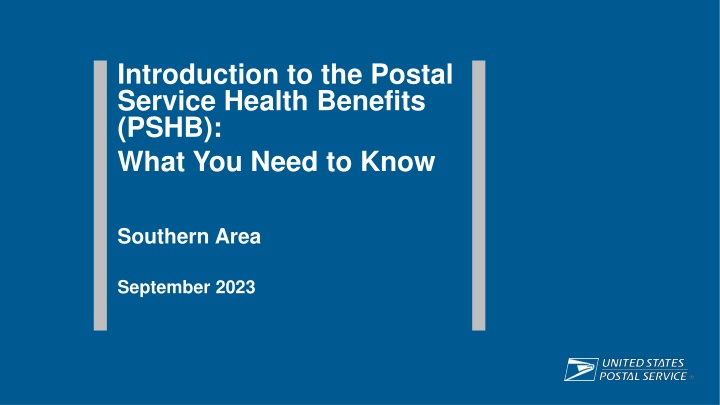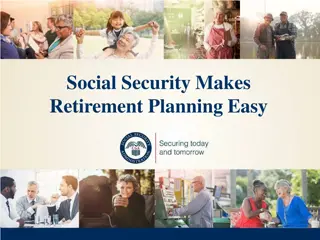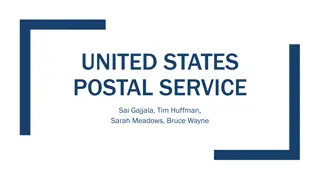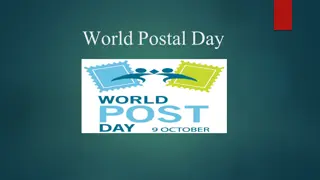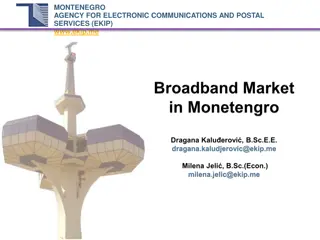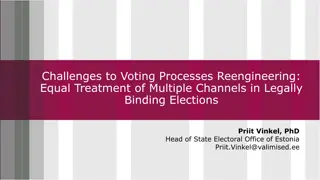Introduction to the Postal Service Health Benefits (PSHB):What You Need to Know
The Postal Service Health Benefits (PSHB) program, mandated by the Postal Service Reform Act of 2022, will provide health insurance to Postal Service employees and annuitants, starting in 2025. Key highlights include the transition to PSHB plan, carriers identification in FY24, and enrollment changes. Active employees have specific requirements regarding Medicare enrollment based on age.
Download Presentation

Please find below an Image/Link to download the presentation.
The content on the website is provided AS IS for your information and personal use only. It may not be sold, licensed, or shared on other websites without obtaining consent from the author.If you encounter any issues during the download, it is possible that the publisher has removed the file from their server.
You are allowed to download the files provided on this website for personal or commercial use, subject to the condition that they are used lawfully. All files are the property of their respective owners.
The content on the website is provided AS IS for your information and personal use only. It may not be sold, licensed, or shared on other websites without obtaining consent from the author.
E N D
Presentation Transcript
Introduction to the Postal Service Health Benefits (PSHB): What You Need to Know Southern Area September 2023
Postal Service Health Benefit (PSHB) Plan Sensitive Commercial Information Do Not Disclose / Attorney-Client Privileged / Attorney Work Product Sensitive Commercial Information Do Not Disclose / Attorney-Client Privileged / Attorney Work Product 4/2/2024
PSHB Overview The Postal Service Reform Act of 2022 mandated the implementation of the Postal Service Health Benefits (PSHB) program. The PSHB is a new plan administered by the Office of Personnel Management (OPM), which will provide health insurance to Postal Service employees, Postal Service annuitants, and their eligible family members starting in 2025. The PSHB plan is within the Federal Employees Health Benefit (FEHB) Program. Key PSHB Highlights: All participants will transition to the PSHB plan. PSHB plan carriers will be identified in FY24. Voluntary Medicare integration opportunity for existing retires will occur FY24. PSHB plan enrollment will transition from PostalEASE to a central enrollment platform (CEP) administered by OPM. Sensitive Commercial Information Do Not Disclose / Attorney-Client Privileged / Attorney Work Product Sensitive Commercial Information Do Not Disclose / Attorney-Client Privileged / Attorney Work Product 4/2/2024
PSHB Facts Below is a list of facts regarding the PSHB Program for active employees: You are required to select a health insurance plan in the PSHB Program during the 2024 open season period, from November 11, 2024 December 9, 2024. If you are an active employee age 64 or older as of January 1, 2025, you ARE NOT required to enroll in Medicare Part B to continue your PSHB health insurance coverage once you retire. However, upon your retirement and entitlement to Medicare Part A (typically at age 65), you will have the option to enroll in Medicare Part B during a special enrollment period. If you are the primary subscriber, your covered family members will not be required to enroll in Medicare Part B to stay on your PSHB plan; however, enrollment in Medicare Part B may reduce your overall costs for health care-related expenses and may provide better value for you and your family. Sensitive Commercial Information Do Not Disclose / Attorney-Client Privileged / Attorney Work Product Sensitive Commercial Information Do Not Disclose / Attorney-Client Privileged / Attorney Work Product 4/2/2024
PSHB Facts If you are an active employee under the age of 64 as of January 1, 2025, to continue your PSHB health insurance coverage in retirement, you WILL BE required to enroll in Medicare Part B after you retire and become entitled to Medicare Part A (typically at age 65). If you are the primary PSHB enrollee, your covered family members will also be required to enroll in Medicare Part B when you retire, upon their entitlement to Medicare Part A, if they wish to remain covered by your PSHB insurance. If you retire on or after January 1, 2025, and you are under 64, you WILL BE required to enroll in Medicare Part B when you become entitled to Medicare Part A (typically at age 65) to remain enrolled in a PSHB plan. The Social Security Administration (SSA) will mail you a notice when you are eligible to enroll in Medicare Part B during your initial enrollment period. Your initial enrollment period starts three months prior to your 65th birthday and ends three months after your 65th birthday. If you are the primary PSHB subscriber, your covered family members will also be required to enroll in Medicare Part B upon their entitlement to Medicare Part A, if they wish to remain covered by your PSHB insurance. Sensitive Commercial Information Do Not Disclose / Attorney-Client Privileged / Attorney Work Product Sensitive Commercial Information Do Not Disclose / Attorney-Client Privileged / Attorney Work Product 4/2/2024
PSHB Facts There are exceptions to the requirement to enroll in Medicare Part B as an annuitant. These exceptions will also apply to your covered family members. Annuitants may be responsible for providing proof of eligibility for the applicable exception(s) to the designated agency. These exceptions are: You are residing outside of the United States and its territories. You are required to follow the policy and procedure set forth by the Postal Service to be eligible for this exception; or You are enrolled in health care benefits provided by the Department of Veterans Affairs; or You are eligible for health services provided by Indian Health Services. As a general rule, spousal and family member PSHB coverage is based on the primary enrollee s eligibility. If the primary subscriber is required to enroll in Medicare Part B, dependent family members will also be required to enroll when they are eligible. Sensitive Commercial Information Do Not Disclose / Attorney-Client Privileged / Attorney Work Product Sensitive Commercial Information Do Not Disclose / Attorney-Client Privileged / Attorney Work Product 4/2/2024
PSHB Annuitant Facts If you are an annuitant as of January 1, 2025, and not currently participating in Medicare Part B, you ARE NOT required to enroll in Medicare Part B to continue your health insurance coverage in the new PSHB Program. Participation in Medicare Part B is voluntary; however, enrollment in Medicare Part B may reduce your overall costs for health care-related expenses and may provide greater value. a) Your covered spouse and eligible family members will also not be required to enroll in Medicare Part B even if they are age 65 or older; however, enrollment in Medicare Part B may reduce overall costs for health care-related expenses and may provide greater value. b) Note: If you are an annuitant as of January 1, 2025, and are already enrolled in Medicare Part B, you ARE required to remain enrolled in Medicare Part B to continue coverage under PSHB. If you are an annuitant entitled to Medicare Part A (typically at age 65) prior to January 1, 2024, and have not enrolled in Medicare Part B, you and your covered, eligible family members may be able to participate in the special enrollment period (SEP) for Medicare Part B that starts on April 1, 2024. Those who enroll during the SEP will not need to pay the late enrollment penalty. Eligibility letters will be sent to annuitants and eligible family members in early 2024. As a general rule, spousal and family member PSHB coverage is based on the primary subscriber s eligibility. If the primary subscriber is not required to join Medicare Part B, neither will dependent family members. Likewise, if you qualify for the SEP, so will your covered family members. Sensitive Commercial Information Do Not Disclose / Attorney-Client Privileged / Attorney Work Product Sensitive Commercial Information Do Not Disclose / Attorney-Client Privileged / Attorney Work Product 4/2/2024
Additional Information on PSHB The PSHB program is part of the FEHB program PSHB plan carriers will be comprised of current FEHB plan carriers Cost sharing for the PSHB plan premiums will be the same as FEHB premiums The 5-year rule regarding continuous coverage encompasses participation in FEHB and PSHB plans Implementation of the PSHB program does not impact your retirement benefits If you are Postal employee who transfers to another Federal agency, you will transition back to FEHB plan participation PSHB plan information will not be available until 2024 Sensitive Commercial Information Do Not Disclose / Attorney-Client Privileged / Attorney Work Product Sensitive Commercial Information Do Not Disclose / Attorney-Client Privileged / Attorney Work Product 4/2/2024
Social Security & Medicare Sensitive Commercial Information Do Not Disclose / Attorney-Client Privileged / Attorney Work Product Sensitive Commercial Information Do Not Disclose / Attorney-Client Privileged / Attorney Work Product
Social Security When can I start collecting my Social Security benefits? Deciding when to start collecting Social Security is one of the most important decisions you'll make. If you are currently facing this decision, there are several things to consider. Social Security benefits are based on your lifetime earnings and are calculated on the amount you would receive at your full retirement age. The actual amount you receive each month depends on when you start receiving benefits. The earliest you can start receiving your Social Security retirement benefits is age 62. Sensitive Commercial Information Do Not Disclose / Attorney-Client Privileged / Attorney Work Product Sensitive Commercial Information Do Not Disclose / Attorney-Client Privileged / Attorney Work Product
Social Security You will receive 100% of your benefits if you wait until your full retirement age. Sensitive Commercial Information Do Not Disclose / Attorney-Client Privileged / Attorney Work Product Sensitive Commercial Information Do Not Disclose / Attorney-Client Privileged / Attorney Work Product
Social Security Sensitive Commercial Information Do Not Disclose / Attorney-Client Privileged / Attorney Work Product Sensitive Commercial Information Do Not Disclose / Attorney-Client Privileged / Attorney Work Product
Medicare Sensitive Commercial Information Do Not Disclose / Attorney-Client Privileged / Attorney Work Product Sensitive Commercial Information Do Not Disclose / Attorney-Client Privileged / Attorney Work Product 4/2/2024
Understanding Medicare If you are eligible for Medicare, you may have choices in how you get your health care. Medicare is a health insurance program for: People 65 years of age and older Some people under age 65 with disabilities People with end-stage renal disease Sensitive Commercial Information Do Not Disclose / Attorney-Client Privileged / Attorney Work Product Sensitive Commercial Information Do Not Disclose / Attorney-Client Privileged / Attorney Work Product 4/2/2024 14
Understanding Medicare Part A Part B Covers inpatient hospital, skilled nursing facility care and home health care. Covers most doctors' bills, as well as some medical services and supplies. Monthly premium No cost for most By signing up for Medicare Part B, retirees may be able to select a lower cost FEHB plan, as well as benefit from lower out-of-pocket costs. Sensitive Commercial Information Do Not Disclose / Attorney-Client Privileged / Attorney Work Product Sensitive Commercial Information Do Not Disclose / Attorney-Client Privileged / Attorney Work Product 4/2/2024 15
Understanding Medicare Part D Part C Prescription drug coverage. Medicare Advantage Plans offered by private companies provide all Part A and Part B benefits. Most include Part D. Normally not necessary if enrolled in FEHB. Normally not necessary if enrolled in FEHB. Monthly premium. Monthly premium. You may save money by enrolling in a Medicare Advantage Plan (Part C) and suspending your FEHB coverage Sensitive Commercial Information Do Not Disclose / Attorney-Client Privileged / Attorney Work Product Sensitive Commercial Information Do Not Disclose / Attorney-Client Privileged / Attorney Work Product 4/2/2024 16
Benefits Information https://liteblue.usps.gov/benefits/ Sensitive Commercial Information Do Not Disclose / Attorney-Client Privileged / Attorney Work Product Sensitive Commercial Information Do Not Disclose / Attorney-Client Privileged / Attorney Work Product 4/2/2024
Planning for Retirement Check out liteblue.usps.gov/retire to visit our page! Sensitive Commercial Information Do Not Disclose / Attorney-Client Privileged / Attorney Work Product Sensitive Commercial Information Do Not Disclose / Attorney-Client Privileged / Attorney Work Product 4/2/2024
Lets Stay Connected Sign Up for SMS Text Messaging! Text messages will include important information related to benefits, wellness, financial education, and more. Text 39369 of the updates you would like to receive: PSHBP For updates on the PSHB program BENEFITS For updates on benefits information RETIREE - For annuitant related information Email questions to: retirementbenefits@usps.gov Sensitive Commercial Information Do Not Disclose / Attorney-Client Privileged / Attorney Work Product Sensitive Commercial Information Do Not Disclose / Attorney-Client Privileged / Attorney Work Product 4/2/2024
